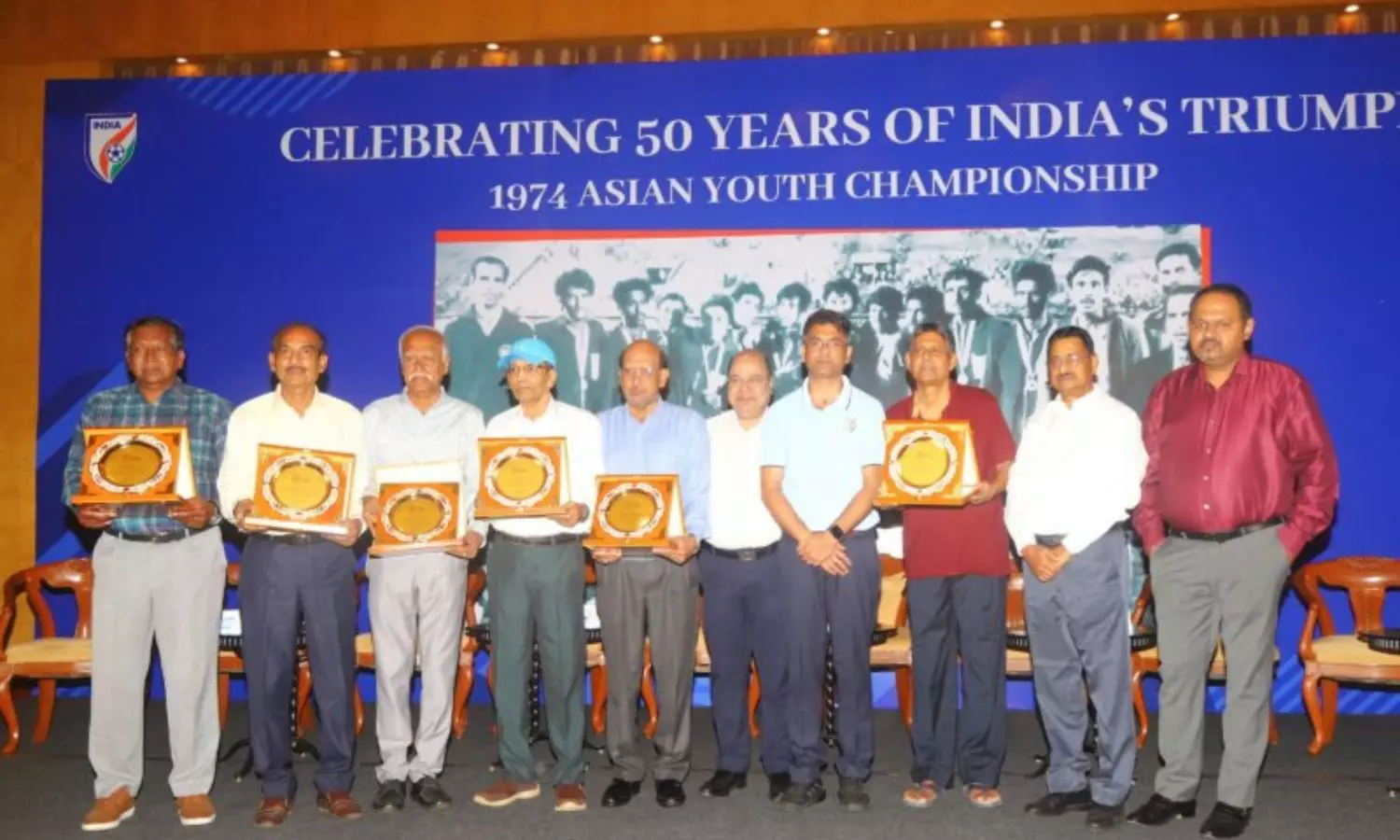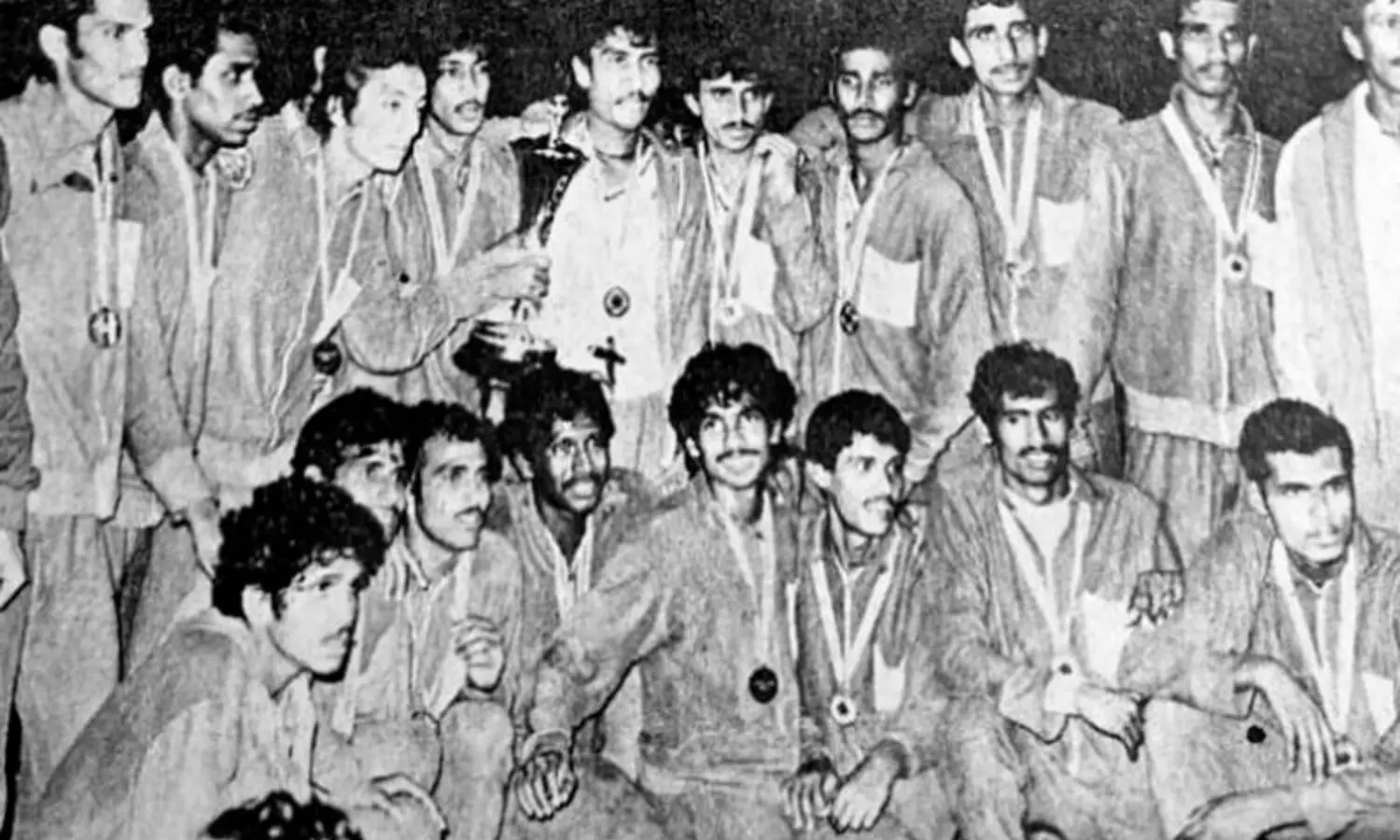Football
'Iranians got car, money and house, we got leather suitcase, nothing more'
The 1974 Asian Youth Championship-winning members of the Indian football team were felicitated in Kolkata on Tuesday on the 50th anniversary of the achievement.

Left to Right: SP Kumar, Gobinda Das, CC Jacob, AIFF president Kalyan Chaubey, Dilip Palit, Shabbir Ali and Shishir Guha Dostidar felicitated at the 50th anniversary of India's victory at the 1974 Asia Youth Championship. (Photo credit: AIFF)
Kolkata: The All India Football Federation (AIFF) felicitated the 1974 Asian Youth Championship-winning members of the Indian football team at Hotel Hindustan International in Kolkata on Tuesday.
50 years ago on April 30, India played out a 2-2 draw against title favourite Iran in Bangkok, in what was the country's last international title.
A vibrant ceremony attended by members of the team - Shabbir Ali, CC Jacob, Dilip Palit, Shishir Guha Dastidar, Gobinda Das and SP Kumar - and AIFF president Kalyan Choubey among other dignitaries, started with a minute of silence in memory of the late members of the team.
Recalling the moments of history
Placed in Group B, along with Laos, Burma (now Myanmar) and Hong Kong, India made a winning start, beating Laos 1-0, with captain Ali scoring the winner.
"The victory set the tone for us and made us confident. Self-belief took over and I scored again in India's second match as we beat Burma by an identical 1-0 margin. Within a span of three days, our entire focus changed," Ali told The Bridge.
But before the tournament, nobody wanted to give India a chance.
"For others, we were just a participant making up the numbers," said Ali. "Even the government did not want to fund our campaign. But later agreed after much deliberations."
India, coached by Olympians Arun Ghosh and Syed Abdus Salam, would play a 2-2 draw against Hong Kong in their final group game, with Mohammed Yaqoob scoring a brace, and advance to the knockouts as the group toppers.
In the high-octane quarterfinal, India trailed 0-1 for most of the match before Ali scored the much-needed equaliser to force the penalty shootout.
"The late Prasanta Mitra, our goalkeeper, turned out to be the hero in the penalty shootout. We won 4-1 and took the next step - a step into the semifinals, and stood two matches away from being crowned champions," Ali recalled.
In the semifinal, the Indians silenced the hosts Thailand, with the visitors winning 2-1. Captain Ali and Yaqoob scored again.
"The entire stadium was silenced by our victory. We could not even celebrate after reaching the final," recalled Dostidar.
With Iran beating giants South Korea in the other semifinal, they were regarded as the title favourites.
"There was hardly anyone who believed that we would give the Iranians a run for the money," said Dostidar, adding, "We were excited and could not sleep the night before the match. Our captain, Ali, checked into our rooms and asked us to sleep. He mandated that we have to win."
"Salam saab and Arun da asked us to stick to the basics," stated Ali.

"On the day of the final, when we were on our way to the stadium, the Iranians, who were separated by two police vans, celebrated even before the kick-off as if they won the title. They did not want to give us any chance," added Ali, who went on to become an Indian legend.
"Iran drew first blood, but soon Latifuddin equalised as regulation time ended 1-1. In the second minute of extra-time, we took the lead," said Ali, who scored his fifth goal of the tournament.
"The Iranians were stunned but we were determined. They went all guns blazing and managed to pull it back some two minutes before the close. The match ended in a 2-2 draw and India were declared joint-winners with Iran," remarked Ali.
When asked how they put up such valiant performances, Jacob said, "We had a month-long camp in Patiala before the tournament. It came in handy." The team was selected by a committee of GMH Basha, PK Banerjee, SA Salam, Arun Ghosh, Nikhil Nandy and J Kittu.
Staid celebration
The epoch-making performance assumes significance today in light of India's failure to qualify for the ongoing AFC U23 Asian Cup.
Despite sharing the title with Iran - a team comprising of players like Nasser Hejazi, a side that would go on to defend the title in the next three editions and also feature in the 1978 World Cup - the celebrations back home were muted.
"We were received by the then AIFF president M. Dutta Ray (Manindra Dutta Ray). We were garlanded at the airport, but our belongings that we received in Thailand were seized at the airport. We got them back later," said SP Kumar.
"Despite lack of exposure back then we won the trophy. But there was hardly any accolades for us. We received a leather suitcase from Mohun Bagan and watches from the organiser, nothing more," Kumar lamented, adding, "The Iranians footballers got cars, houses and money."
"But we are honoured that AIFF, after 50 years, has felicitated us for the achievement. This event will make Indian fans and footballers aware of our achievement," said Ali, a member of the AIFF technical committee, highlighting the significance of the Kolkata event.
'Preserving history of Indian football important'
AIFF president Kalyan Choubey, meanwhile, said, "It is important to acknowledge and document the history of our glorious past. Without knowing our past, we cannot proceed about the future. Our young footballers will be inspired knowing that we won the Asian Youth Championship."
Choubey also stressed the reason for documenting the history of Indian football.
"I want to study and research about Indian football more. Lack of preservation of data leads to manipulation of facts often. We do not know which facts are correct or which are not. In Indian football, nobody can claim that their presentation of facts and history is completely correct. So, as the nodal authority of Indian football, we feel there is a need for setting up an archive where one can approve the veracity of data. The data will be considered acceptable then," stated Choubey.
"Last year, granddaughter-in-law of Mariappa Kempaiah published his biography where I wrote the forward. It will be relaunched in Kolkata. We have also initiated a process for publishing a biography of independent India's first captain T Ao. What I got to know is that T Ao went to Assam by walking to play football. So, the history of Indian football regarded T Ao as an Assamese. The Nagaland government has been appealing for a long time to declare him as a resident of the state," he discerned.
"The reason why I am saying this because if a person is coming from a remote locality, one change in history can inspire an entire state or the Northeast region," stated Choubey.

